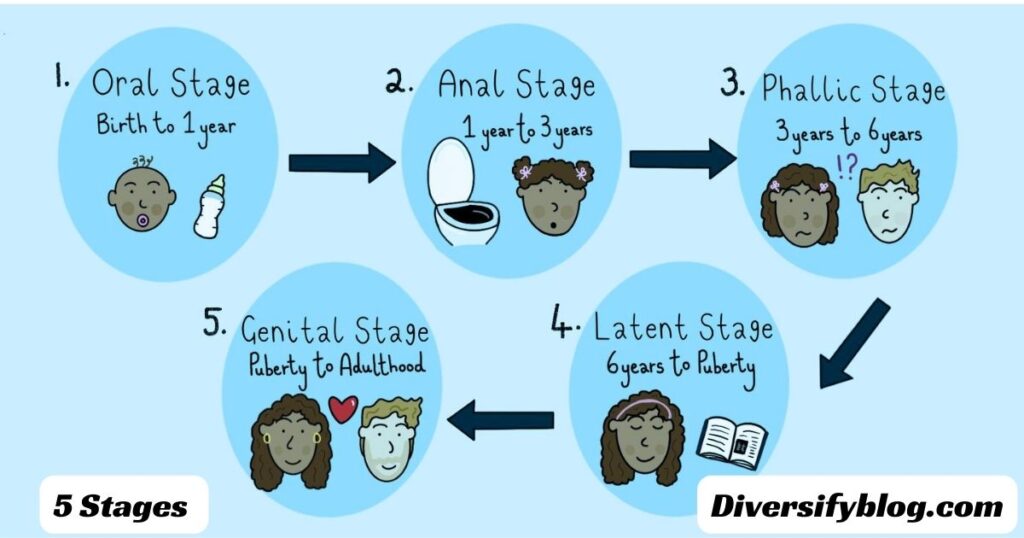Introduction:
Childhood is an incredible journey with distinct stages, each crucial in shaping your child’s future. In this article, we’ll explore the 5 stages of child development psychology, unraveling the intricacies from infancy to emerging adulthood. Understanding these stages will help you support your child’s growth effectively.
Table of Contents
Brief Overview of Child Development Psychology: Unlocking the Secrets of Growth
Child development psychology examines the psychological processes of growth and change in children. It covers physical, cognitive, emotional, and social development. For parents, educators, and psychologists, understanding these developmental stages provides insights into children’s evolving needs and capabilities.
Importance of Understanding Developmental Stages: Building Strong Foundations
Recognizing and comprehending the stages of child development is vital. It enables caregivers and educators to create nurturing environments that promote optimal growth, ensuring children navigate each stage with necessary support and guidance.
Stage 1: Infancy (0-2 years):
Physical Development: From Cooing to Crawling
In infancy, your baby undergoes rapid physical changes. From their first adorable smiles to tentative steps, every milestone is significant. Encourage tummy time to strengthen their muscles and provide safe spaces for crawling and exploring. As they gain control over their bodies, they start to develop motor skills like grasping objects, sitting up, and eventually walking.

Cognitive Milestones: The Spark of Curiosity
Infants explore the world through their senses, laying the foundation for future intellectual growth. They begin to recognize familiar faces, respond to voices, and show curiosity about their surroundings. Stimulate their cognitive development with age-appropriate toys, play peek-a-boo, and introduce them to different textures and sounds. These activities help build neural connections essential for later learning.
Social and Emotional Changes: The Bonds that Shape
Infancy is a period of forming attachments and emotional bonds. Responding to your baby’s cries, cuddling them, and maintaining eye contact helps them feel secure and loved. This is crucial for their emotional development, as it builds trust and lays the groundwork for healthy relationships later in life.
Stage 2: Early Childhood (2-6 years):
Language Development: From Babble to Speech
During early childhood, your child’s language skills will flourish. They go from babbling to forming complete sentences. Reading to them daily, talking about everything you do together, and encouraging them to express themselves are key activities. These practices enhance their vocabulary and communication skills, essential for future academic success.
Motor Skills: The Dance of Coordination
Your child’s motor skills become more refined in this stage. They’ll be running, jumping, and exploring their physical capabilities. Encourage playtime with activities that enhance coordination, such as puzzles, building blocks, and outdoor games. Fine motor skills like drawing and using utensils also develop, preparing them for school tasks.
Socialization and Play: The Building Blocks of Relationships
Early childhood is a time of social exploration through play. Playdates and group activities help children learn about sharing, cooperation, and navigating friendships. Role-playing games and team sports are excellent for developing social skills and understanding how to interact with others.
Stage 3: Middle Childhood (6-12 years):
Cognitive Advancements: The Blossoming Mind
In middle childhood, children’s cognitive abilities undergo significant refinement. They become more logical, develop problem-solving skills, and start to think more abstractly. Support their learning by helping with homework, encouraging curiosity, and providing opportunities for exploration and discovery.
School and Learning: The Journey of Knowledge
Formal education becomes a central part of their life. Foster a positive attitude towards education by showing interest in their schoolwork, celebrating achievements, and addressing any academic challenges promptly. This support helps instill a lifelong love of learning.
Peer Relationships: Friends and Beyond
Friendships become increasingly important during this stage. Children learn to navigate peer relationships, develop empathy, and manage conflicts. Encourage positive social interactions, guide them in resolving disputes, and help them build strong, healthy relationships.
Stage 4: Adolescence (12-18 years):
Puberty and Physical Changes: The Teenage Metamorphosis
Adolescence brings about profound physical changes due to puberty. These changes can be overwhelming for teens. Open communication about these changes, providing reassurance, and promoting a healthy self-image are crucial. Help them understand that these changes are a natural part of growing up.
Identity Formation: Discovering Self
Adolescence is a time for self-discovery and identity formation. Teens explore different aspects of themselves, including their interests, values, and beliefs. Encourage them to pursue their passions, provide support in their journey of self-discovery, and foster a sense of independence while being available for guidance.
Challenges and Opportunities: Navigating the Teenage Landscape
Adolescence comes with unique challenges and opportunities. Teens face academic pressures, social dynamics, and the quest for independence. Be a supportive presence, offering guidance without being overly intrusive. Encourage open communication, listen to their concerns, and help them navigate this critical stage successfully.
Stage 5: Emerging Adulthood (18-25 years):
Transition to Adulthood: Finding Independence
Emerging adulthood marks the transition from adolescence to adulthood. Young adults seek independence and autonomy. Support them by providing a balance of freedom and guidance. Encourage them to take responsibility for their decisions and actions, helping them develop into self-reliant individuals.
Independence and Decision-Making: Charting One’s Course
During this stage, young adults make significant life decisions, including career choices and personal relationships. Encourage thoughtful decision-making and be a sounding board for their ideas. Your support helps them feel confident in their choices and prepares them for the responsibilities of adulthood.
Career Development: Pursuing Passions
Emerging adulthood often involves career exploration and development. Encourage your child to pursue their passions and interests, whether through higher education, vocational training, or entering the workforce. Support their career aspirations by providing resources, networking opportunities, and emotional encouragement.
Common Challenges and Interventions Across Stages:
Addressing Developmental Concerns: A Holistic Approach
Recognizing and addressing developmental challenges require a holistic approach. Collaborate with educators, mental health professionals, and other caregivers to ensure comprehensive support. Early intervention can significantly improve outcomes for children facing developmental difficulties.
Parental Roles and Support: Nurturing Growth
Understanding the roles parents play in each stage is vital. Providing emotional support, creating a conducive environment for learning, and being actively involved in your child’s life enhances their overall well-being. Your presence and support are crucial in helping them navigate each developmental stage successfully.
Cultural Influences on Child Development:
Diversity in Developmental Trajectories: Embracing Differences
Children from diverse backgrounds may follow unique developmental trajectories. Appreciating and accommodating these differences contribute to inclusive environments. Recognize that cultural factors can influence development and adapt your support to meet the needs of children from various backgrounds.
Cultural Considerations in Psychology: A Global Perspective
Understanding how cultural factors influence child development enhances cultural competence in psychology. It fosters a more comprehensive and effective approach to supporting children from different cultural backgrounds. Embrace a global perspective to better understand and support the diverse developmental needs of children.
Contemporary Perspectives in Child Development Psychology
Evolutionary Psychology: Tracing the Roots of Behavior
Exploring the evolutionary basis of behavior helps in understanding why certain developmental patterns have evolved and persisted over time. This perspective provides insights into the fundamental aspects of child development and behavior.
Neurobiological Approaches: Unraveling the Brain’s Role
Advancements in neuroscience shed light on the intricate connections between brain development and psychological processes in children. Understanding these connections helps in developing effective interventions and support strategies for optimal child development.
Conclusion:
In conclusion, a journey through the 5 stages of child development psychology unveils the complexity and beauty of human growth. Recapping the key developmental stages emphasizes the importance of tailored support for each phase, with profound implications for parenting, education, and the future directions of child development research. As we embark on this exploration, let us remain committed to nurturing the minds of the future generation with knowledge, empathy, and unwavering support.
People Also Asked:
What are the 5 stages of child development in psychology?
- Infancy (0-2 years): Physical growth, sensory exploration, trust formation.
- Early Childhood (2-6 years): Language development, motor skills, social play.
- Middle Childhood (6-12 years): Cognitive growth, school learning, peer relationships.
- Adolescence (12-18 years): Puberty, identity formation, social challenges.
- Emerging Adulthood (18-25 years): Independence, life decisions, career development.
What are the five 5 areas of development in a child?
- Physical Development: Body growth, motor skills.
- Cognitive Development: Thinking, problem-solving.
- Emotional Development: Managing emotions, empathy.
- Social Development: Interacting with others, relationships.
- Language Development: Speaking, understanding, reading, writing.
What are the 5 stages of emotional development in childhood?
- Trust vs. Mistrust (Infancy): Trust in caregivers.
- Autonomy vs. Shame and Doubt (Early Childhood): Personal control, independence.
- Initiative vs. Guilt (Preschool Age): Asserting control, accomplishing tasks.
- Industry vs. Inferiority (School Age): Coping with social/academic demands.
- Identity vs. Role Confusion (Adolescence): Personal identity, self-discovery.
What is the stage 5 of human development? Emerging Adulthood (18-25 years):
Transition to independence, making life decisions, and career development.



















